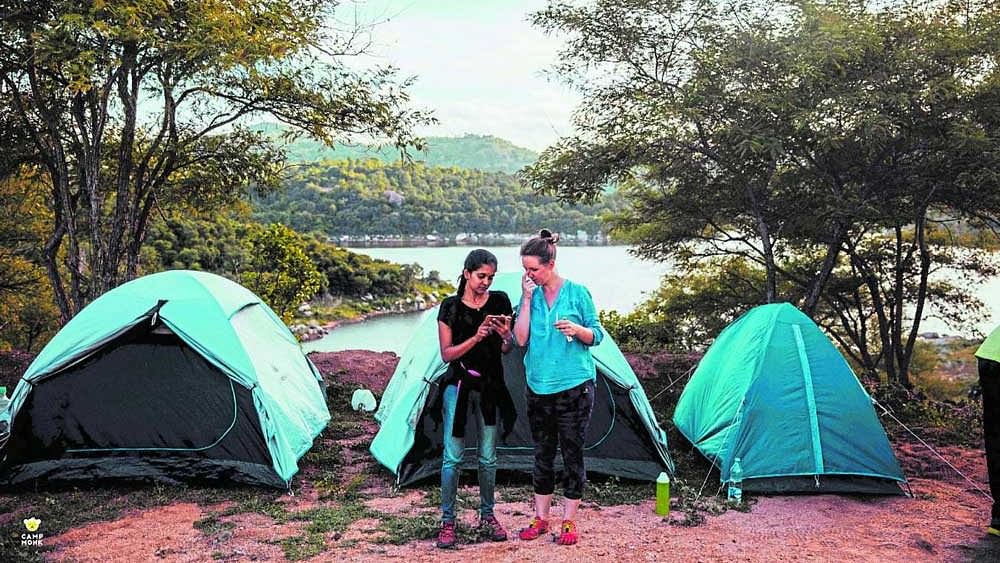
There is an increasing thrust on sustainable tourism among travellers.
DH Photo
In August this year, activists in Barcelona sprayed tourists with water pistols. The act was in protest against 'overtourism' which increased rents for the locals. Placards read 'Go Home'. The writing was indeed on the wall... that they don't want tourists.
Earlier this year, in Japan, the tourists' dream of taking photos of Mount Fuji from the sidewalks were shattered after officials there placed a large black screen to block the view of the stunning mountain. The tourists were said to be jaywalking and littering the streets.
Local communities in various countries are beginning to say enough is enough to tourists who are taking away their livelihood and peaceful existence — the economic growth and jobs brought in by tourism notwithstanding.
As another World Tourism Day passes by, responsible tourism once again remains a dream destination.
Keeping apart the normal leisure travel, these are times when culinary, religious, wedding and wildlife tourism are spiralling but these travels are more often fraught with cultural insensitivity, littering, leaving of trash behind, abuse of wildlife, spitting paan in public spaces, discarding drink cans in lakes and beaches, scribbling on monuments, wasting food and disrespecting the people and culture of the destination.
All these are cumilating in disrespectful tourism.
Closer home, irresponsible tourism has always been a reality even as overtourism is threatening the ecosystem. Himachal Pradesh, Uttarakhand and Goa are only some of the destinations bearing the brunt of overtourism and irresponsibility that comes with it. Remember the pictures of kilometres-long traffic congestion at Manali?
Avoiding crowded 'touristy' places is then the first step in the direction of responsible tourism.
"For me responsible tourism is all about travelling sustainably. It starts right from planning your travels, to actual travel and experiences, and how you interact with communities," says Siddharatha Joshi, a photographer and traveller. He finds taking a train over a flight is not just better for the world, but also economically more sustainable.
"This change isn’t always easy but will have the biggest impact on your carbon footprint on the trip," he says while asking travellers to "eat food that’s locally produced and adds to the local economy''.
Joshi points out that typically, local delicacies have local ingredients. "Staying with local hotel chains, and home stays over large corporate hotels also contribute to the local economy," Highlighting the importance of carrying one's own water bottle, he says, "Not littering waste also contributes to travelling consciously and responsibly."
"There’s nothing like 100% sustainable tourism for now, but we can always choose one which is more sustainable than others," Joshi says.
Ameya Deo has been in the travel industry for more than 15 years, meeting many different people and visiting new destinations across the country and the globe. "I feel that a responsible traveller is someone who wants to live the destination to the fullest which he/she is visiting," he says.
He lists out vital pointers which a responsible traveller should look into and practice. "This always helps us to understand and get immersed in the destination’s culture and diversity. As a responsible tourist, one should try to support local businesses, such as eating at street food vendors and buying local art directly from artisans. This encourages in getting a more authentic experience while supporting the local economy," Deo explains
He emphasises on respecting the destination’s cultural norms. "This helps one embrace new experiences, cultures, and languages," he adds.
Deo also advises travelling during off peak seasons to help alleviate over-tourism thereby reducing the impact on local resources and enhancing one’s experience by avoiding crowds and higher prices.
Conservation of natural life is another practice that Deo feels travellers should practice. "Use of local public transportation while moving around the destination gives you a feeling of being a local," he says
But clearly not all travellers are vanguards of responsible and sustainable tourism.
With distant destinations now more accessible, and spending power increasing, overtourism is bound to happen, which in turn is killing local culture and increasing carbon footprints by not following sustainable practices.
A good place to start is by beginning to consider the destination as your own home, respecting local communities as your own.
It's not all about the traveller though. Responsible tourism calls for governments, tourism boards, tour operators, hoteliers and local people to actively contribute to it.
Keerthana Prakash, a counselling psychologist, has always loved exploring new places. "I feel that we can be more responsible as travellers if we could try our best to be more sensitive by respecting the region’s local traditions," she said.
She recommends travelling during off season, if possible, to reduce overcrowding and thus have a peaceful trip.
"It is very important that we don’t litter the surroundings as travellers and that’s a little effort you can put in to show that basic respect to the city or town.
Please be patient and mindful of the way you handle situations especially when you travel abroad. This world is beautiful because of Mother Nature and the people who choose to protect it," she adds.
Meghana P, a Bengaluru-based fashion design student, considers travelling an essential part of life. However, she says we must make sure that we don’t disrupt the lives of those who are responsible for welcoming us to their beautiful cities and towns.''
"We must respect local customs, traditions and cultural norms. We need to respect their private spaces and be mindful of not creating any kind of nuisance.
As responsible citizens of our own countries we must act responsibly in other lands in terms of disposing waste properly and avoiding littering to keep the environment clean for both locals and future visitors. We must be polite and patient when interacting with locals, acknowledging language barriers and cultural differences," she says.
It is responsible tourism that leads to sustainable tourism and both are not the same. In the end, the tourism industry can survive only if best practices are followed.
And as Deo says following responsible practices helps one have a holiday experience that will be a life-long experience.
Whichever road you take, responsible tourism by all means is about 'give and take' while exploring the world. The road less taken is certainly the best!
